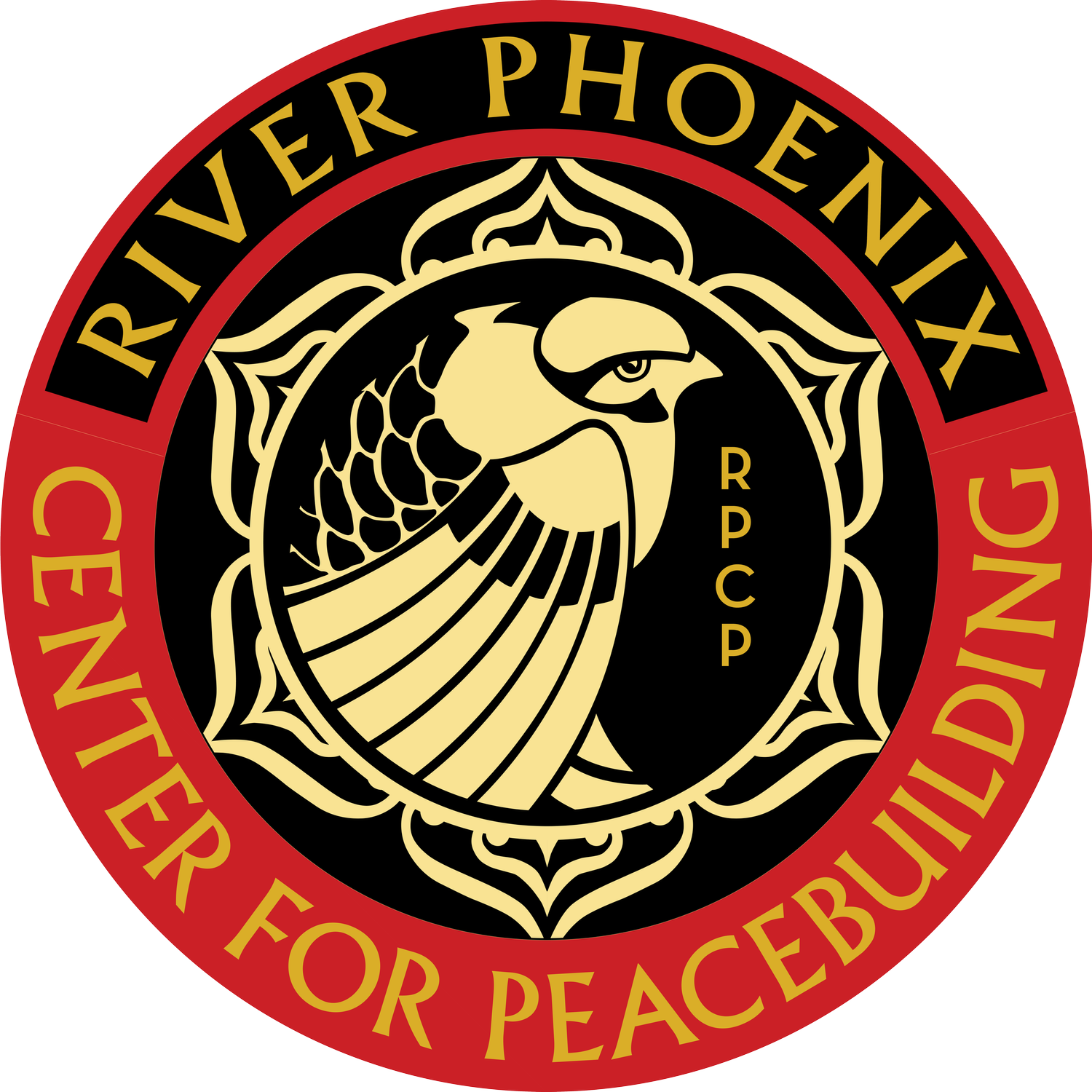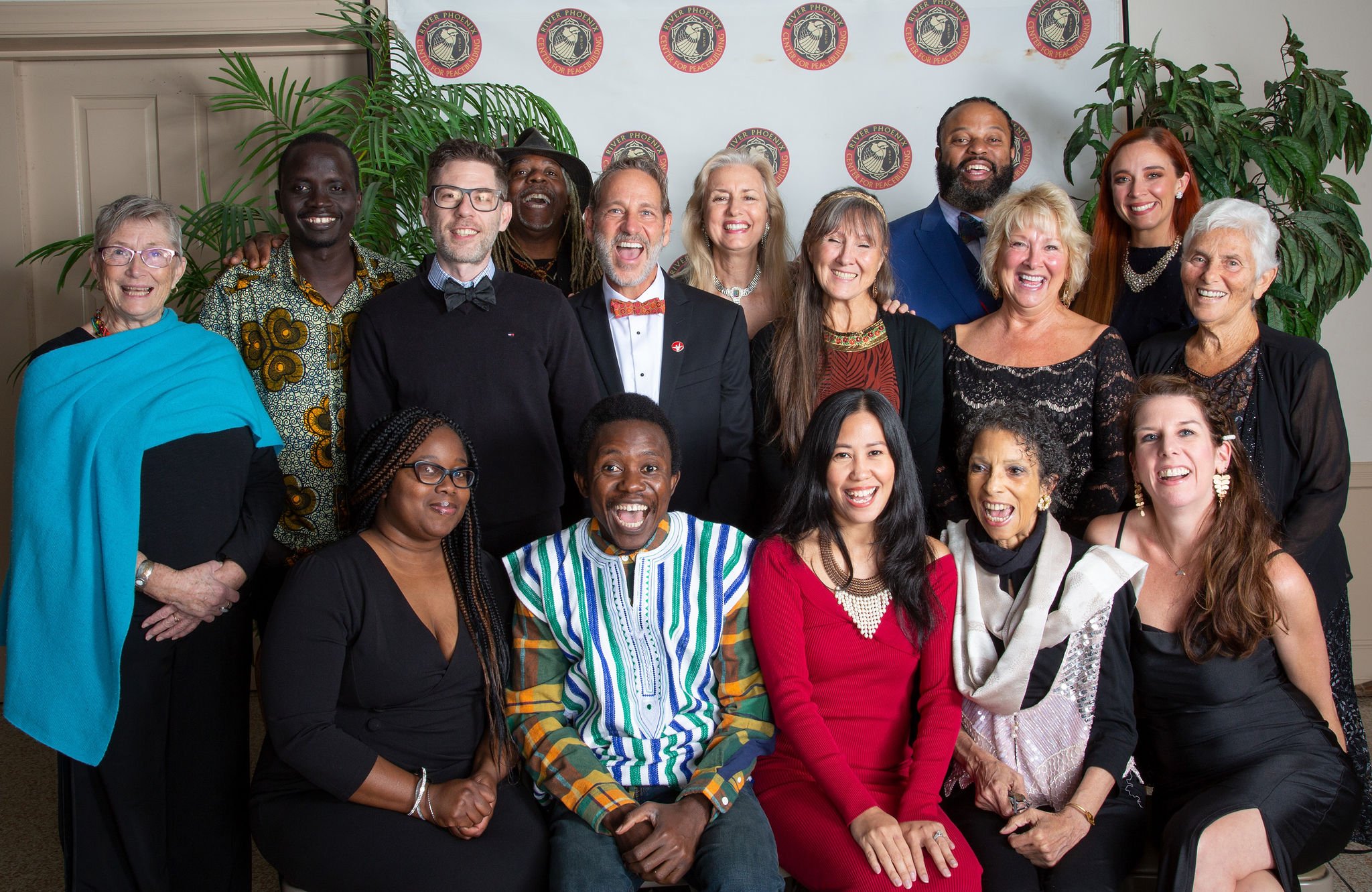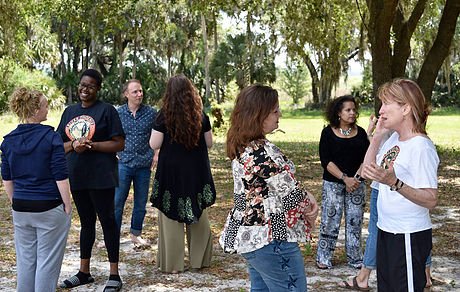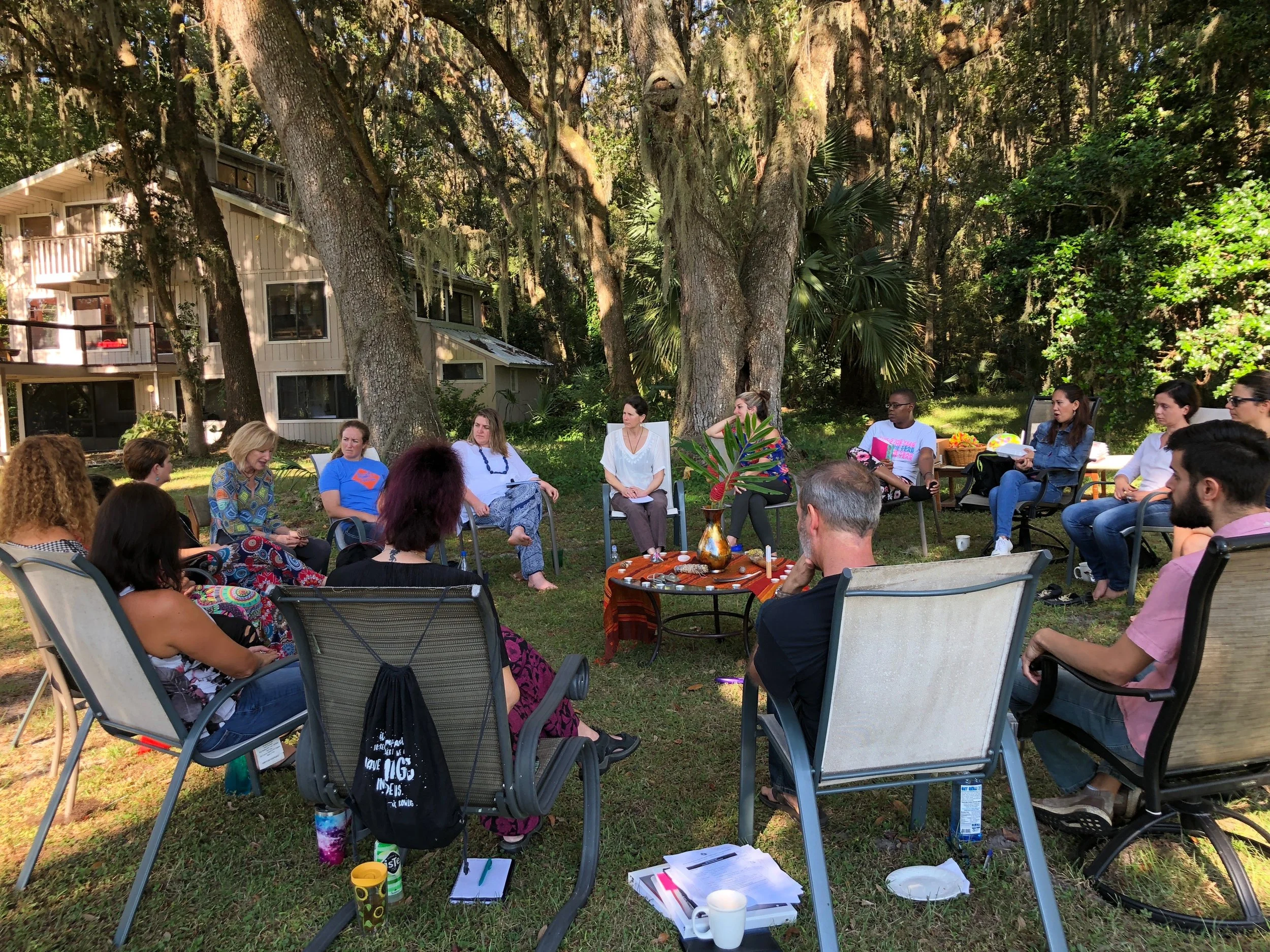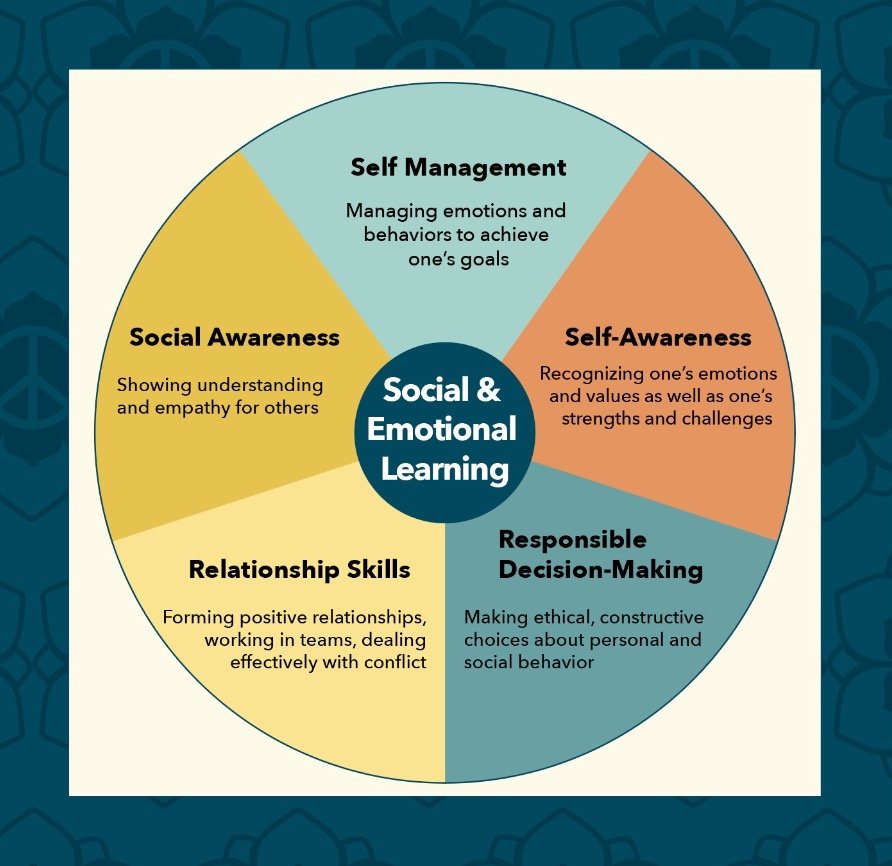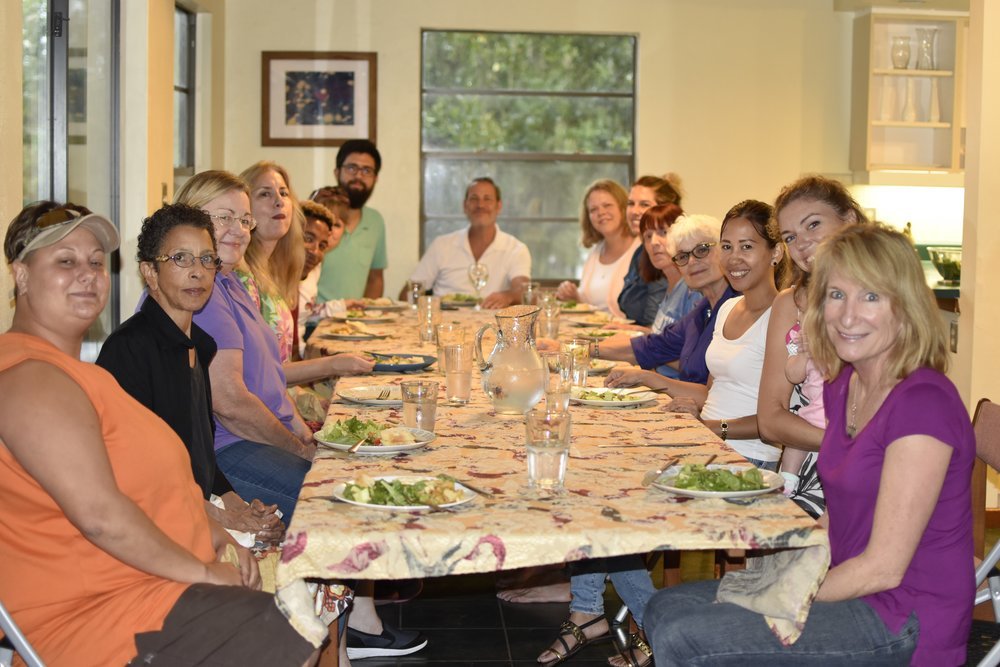Introducing our 2024 Residential Community Peacebuilding Immersion Experience
Join us amidst the natural beauty of the Florida Countryside for our residential immersion as we dive deeply into the wonderful world of peacebuilding.
FRIDAY EVENING, MAY 17 thru SUNDAY MORNING, MAY 26, 2024
SUNRISE, RECENT PAST PARTICIPANTS, SWIMMING POOL, LAKE (no swimming)
Springtime in Florida is beautiful.
Everything is bursting anew! How about you?
Friday Evening, May 17 through Sunday Late Morning, May 26, our Residential Immersion will begin
We created this experience comprehensive community peacebuilding model based on the work we’ve been doing at our center in Gainesville, FL for the past ten years. The program consists of a ten-day in-person residential immersive experience.
Peacebuilding is an emergent field empowering individuals and communities to interrupt cycles of conflict and violence by addressing root causes and facilitating changes in the underlying beliefs, attitudes and behaviors. Though many in Western culture define peace as simply the absence of violence or war, we at River Phoenix Center for Peacebuilding (RPCP) believe it is this—and more.
We also view peace as a state of harmony and tranquility within the mind and in relation to others, the environment and all life. We believe global peace and peace among nations is possible and it can be realized once enough individuals experience peace within themselves and in their families, workplaces, and communities.
The natural beauty and serenity of our retreat location are an ideal setting for this transformative program. These experiential modules include expert presenters, multimedia presentations, games, dialogues, mindfulness activities and outings in nature to support a variety of learning styles.
SPACE IS LIMITED TO 12 PARTICIPANTS
COST FOR THE PROGRAM is between $2000 - $3000 This includes Materials, Lunches and Snacks throughout the day.
FINANCIAL ASSISTANCE IS AVAILABLE
For those from out-of-town, there is an additional fee for LODGING FOR NINE NIGHTS. Shared Room $225.00 per person - 3 available Private Room - $315 - 4 available
Breakfast and dinner are not provided. However, the home contains a large kitchen fully stocked with appliances, pots, pans, tableware, spices, and a dishwasher.
Interested in finding out more:
info@centerforpeacebuilding.org
To fill out the application: Click Here
“There was a perfect blend of education and personal introspection, along with interaction, to show how these contribute to peace by understanding people and the hidden pressures impacting a community”
Past Participant
Community Peacebuilder Ten-Day
Residential Immersion Experience
Community Peacebuilder Immersion Video
Participants will emerge from this program with:
Heightened awareness of our interconnectedness and one common humanity
Practical skills for building and sustaining healthy relationships
Increased self-confidence and capacity to promote peaceful conflict resolution
Knowledge of a Comprehensive Community Peacebuilding Model that can be translated anywhere
Inspiration and resources to catalyze tangible peacebuilding initiatives
A supportive community that shares a common objective of fostering peace
Foundations of Peacebuilding
“Peace is not merely a distant goal that we seek, but a means by which we arrive at that goal.”
~Martin Luther King, Jr.
In this immersive experience, we explore the foundational elements that are essential for cultivating peace personally and collectively. Our work begins in the realm where we have the most influence and capacity to affect change–within ourselves. Self-awareness and emotional self-management are necessary skills for being in healthy, harmonious relationships with all of life. Greater understanding of ourselves serves as the basis for understanding others so that we can be effective peacebuilders. During this intensive, participants will:
Learn and practice concepts of circle facilitation
Explore paradigms, beliefs and strategies for cultivating peace
Understand distinctions of power within ourselves and in relationship with others
Expand awareness and understanding of Social-Emotional Learning
Understand the impact of trauma and the pathways to resilience
Learn principles and practices of Restorative Justice
Have a greater vision for how community peacebuilding is translatable the world over.
Building our Tool Kit
“The secret of change is to focus all of your energy not on fighting the old, but on building the new.” ~Socrates
Next, we build upon the theory of change, including peacebuilding models used throughout the world to facilitate cooperation and transformation. We begin where we left off, reflecting on our own practice and how we influence those with whom we work, live and play. In this next level of training, we further develop our tool kit and strategies that expand our capacity and confidence to facilitate change on a deeper level.
During this immersion experience, participants will:
Recognize opportunities for embedding peacebuilding practices within communities and larger systems
Explore the paradox of power and the distinction between “power with” vs “power over”
Expand awareness and understanding of historical trauma and racial inequity
Experience Restorative Justice Basic Practitioner Training
Receive practice and coaching on effective dialogue and circle facilitation
Learn principles and practices of nonviolent action
Experience a panel discussion with RPCP community collaborators and key partners
Begin to develop a personal leadership plan and a plan for community action
Community-Based Peacebuilding:
From Vision to Action
“Every great dream begins with a dreamer. Always remember, you have within you the strength,
the patience, and the passion to reach for the stars to change the world.”
~Harriet Tubman
The focus of our next step is putting our knowledge and skills to work in the service of others. In this experience, we further refine our skills and capacity to influence change on a larger scale, as we explore actionable ways to shift our collective paradigms—from violence to peace, from power-over to power-with, and from punishment to restoration.
As participants you will:
Gain confidence and ease in effectively communicating key principles, strategies and benefits of peacebuilding
Examine how to form powerful alliances and partnerships to bring about change
Receive mentoring, coaching and feedback on the facilitation of key concepts
Further develop individualized action plans
Receive guidance and mentoring on the implementation of action plans
Explore best practices for self-care and sustainable action
TEN-DAY IMMERSION OVERVIEW:
Introduction to RPCP's Philosophy and
Model for Community Peacebuilding
Social, Emotional and Ethical Learning (SEE)
2 Day Restorative Practices and Restorative Justice Basic Training
Police Youth/Educator Student/Community Dialogues
Trauma Awareness and Resilience Building
Solution-Focused Conflict Coaching
Communication and Conflict Resolution
Reflection and Intrapersonal Awareness Building
Building Facilitation Skills
Racial Equity
Nonviolent Action
Observation of Police/Youth Dialogue
Panel Discussion with Key Community Partners
IMMERSION OBJECTIVES:
Immersion Content
To provide the knowledge, skills, and support for developing participants’ confidence and competence in creating successful peacebuilding practices in their personal lives and communities.
To empower and catalyze tangible, impactful, local peacebuilding efforts in communities, schools, the justice system and neighborhoods.
To inspire and encourage the development of centers for peacebuilding.
To develop a community of practice for peacebuilders, sharing successes, troubleshooting, and inspiring others to join the field of peacebuilding.
This residential experience will provide the knowledge, skills, and support for inspiring and operationalizing peacebuilding practices in your life and work, potentially creating a center for peacebuilding, within your community.
Core Principles of Peacebuilding
Peacebuilding is an emerging field that empowers individuals and communities to interrupt cycles of violence by establishing relationships, systems and infrastructures for living in harmonious relationships with self, others, and all life. Peacebuilding addresses the impact and root causes of violence and conflict by acknowledging and changing the beliefs, attitudes and behaviors underlying conflict. As root causes are addressed, pathways for resolution, reconciliation and transformation become evident, thus enhancing safety and stability, while simultaneously decreasing the possibility of violence in the future.
Social-Emotional Competencies
Social-Emotional Competence is an essential set of life skills fundamental to peacebuilding. These competencies include: identifying and managing one’s emotions, embracing conflict as opportunity for establishing more positive, constructive relationships, shared empathy, effective communication, and responsible decision making. Teaching these skills requires a level of proficiency on the part of the trainer. The immersion experience enhances understanding of social-emotional learning for participants and provides a 10-week curriculum for teaching these skills to others in an engaging, experiential way.
Facilitation Skills
During the immersion, participants will learn core aspects of facilitation, while enhancing their leadership skills. The definition of facilitate is to “make easy” or to “ease a process.” The facilitator’s role is therefore to plan, guide or manage a process, dialogue or meeting, so that the group’s objectives are met effectively and with the full participation of all members. The facilitator helps empower the group to arrive at new ideas, understandings, and decisions. Effective facilitation requires the ability to translate, reframe and de-escalate conflict, while drawing out the knowledge and wisdom of the group.
Immersion participants will have opportunities to practice a variety of facilitation techniques and receive coaching and feedback to better hone their skills. While the concepts of Peacebuilding are simple to understand, they are not always easy to implement. Through the immersion, participants learn how to recognize and release biases, prejudices and judgments that can get in the way of effective facilitation. Participants will be coached on how to deal with challenging situations and conflicts, guiding individuals to find common values, principles, and/or strategies. You will come away with a framework to help others shift their perceptions and be open to wider range of perspectives, options and solutions.
Restorative Justice & Practices
Restorative Justice (RJ) and practices is an evidence based process that has been used by aboriginal tribes for thousands of years. It moves us from a punishment model to a restorative model which allows for accountability, respect, community engagement and healing among participants. RJ seeks to restore and repair harm by bringing together those directly or indirectly impacted by a specific conflict, offense, crime, incident, etc. RJ is not just for crime, but any situation in which there has been harm or a break in a relationship. It can be used to address issues in schools, the workplace, neighborhoods, prisons and within families and other relationships.
The RJ process involves bringing interested parties together in a facilitated circle conversation. The circle includes those directly or indirectly involved, as well as supporters and others interested in making things better. Everyone’s voice is heard during the circle. All participants get to share about the impact of the incident, how to address the harm and actions for making amends. These action items are put into a written agreement, which is signed by all.
Establishing a Trauma Responsive Community Initiative
Various experts call it the nation’s #1 public health problem. The largest national public health study you’ve probably never heard of—shows this malady is all too common—with effects that are far reaching and long term. According to the Centers for Disease Control (CDC), “Some of the worst health and social problems in our nation can arise as a consequence of adverse childhood experiences” also known as childhood trauma.
Continued Development
Your immersion experience is only the beginning of your journey to developing peacebuilding practices in your community. RPCP will continue to work with you to celebrate your successes and help you navigate your challenges. In addition to ongoing tele-meetings, you will be inducted into our learning community as a Community Peacebuilder Alumni and continue to receive support and collaboration with others who have experienced RPCPs immersion.
